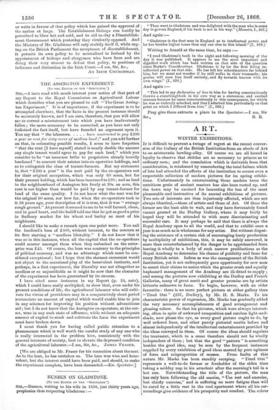THE ASSINGTON EXPERIMENT.
[To THE EDITOR OP THE "SPECTATOR."]
SIR,—I have read with much interest your notice of that part of my Report to the Royal Commission on Agricultural Labour which describes what you are pleased to call " The Great Assing- ton Experiment." It is of importance, if the experiment is to be attempted elsewhere, that the facts in the present instance should be accurately known, and I am sure, therefore, that you will allow me to correct a misstatement into which you have inadvertently fallen ; the more necessary to be corrected, as you have not only italicized the fact itself, but have founded an argument upon it.
You say that " the labourers have contracted to pay £200 a year as rent for sixty acres of medium land ;" and you add further on that, in estimating possible results, I seem to have forgotten " that the rent [I have myself] stated is nearly double the amount any single tenant would agree to pay for such land," which you consider to be "an immense bribe to proprietors already heavily burdened " to convert their estates into co-operative holdings, and so to extinguish the class of tenant-farmers. But my statement is, that "£200 a year" is the rent paid by the co-operators not for their original occupation, which was only 60 acres, but for their present holding, which has been increased to 130 ; and as land in the neighbourhood of Assington lets freely at 30s. an acre, this rent is not higher than would be paid by any tenant-farmer for land of the same quality. I do not know what the rent was for the original 60 acres, nor how far, when the co-operators took to it 38 years ago, your description of it is true, that it was " average rough ground." At present it seemed to me to be well farmed, clean, and in good heart, and the bailiff told me that he got as good a price in Sudbury market for his wheat and barley as most of his neighbours.
I should like to make a remark upon one point more. You call the landlord's loan of £400, without interest, to the concern at its first starting a " needless liberality." I do not know that it was so in this instance, when all the capital that the co-operdtors could muster amongst them when they embarked on the enter- prise was £45. Of course, the loan was contrary to the principles of political economy, and was an advantage which must be con- sidered exceptional ; but I hope that the sternest economist would not object to the occasional play of the benevolent instincts, and perhaps, in a first experiment, the liberality was not altogether so needless or so unjustifiable as it might be now that the character of the experiment has been guaranteed by its success.
I have cited some instances in my Report (p. 24, note), which I could have easily multiplied, to show that, even under his present conditions of life, the agricultural labourer who will culti- vate the virtue of providence may in a comparatively short period accumulate an amount of capital which would enable him to join in any schemes for improving his position without adventitious aid ; but I do not know that the Assingtou co-operators, at the out- set, were in any such state of affluence, while without an adequate amount of capital to stock and cultivate the farm the experiment must have broken down.
I must thank you for having called public attention to a phenomenon which is well worth the careful study of any one who is really interested in the problem how, consistently with the general interests of society, best to elevate the depressed condition of the agricultural labourer.—I am, Sir, &c., JAMES FRASER.
[We are obliged to Mr. Fraser for his correction about the rent. As to the loan, he has mistaken us. The loan was wise and bene- volent, but the interest could have been paid, and should, to make the experiment complete, have been demanded.—En. Spectator.]


































 Previous page
Previous page